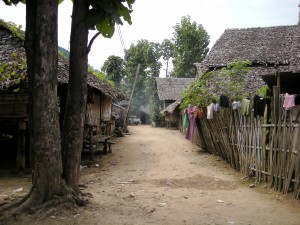TORONTO, Feb. 21, 2012 – York University is helping refugees on the Thai-Burma border earn university diplomas, through a course taught in Toronto and delivered over the Internet.
The course is part of the “Borderless Education: Intercultural Learning for Refugees” project, which helps refugees from Burma (also known as Myanmar) gain transcripts and exposure to Western-style lectures for admission to degree programs in Thai universities, or universities of their countries of resettlement. It’s part of a larger global effort initiated by the Australian Catholic University (ACU) to bring higher education to young people living in refugee camps. York University is the only Canadian postsecondary institution involved in the ACU initiative.
“Some of these students were born and raised in refugee camps, and they rely entirely on the UN for food and aid. It’s crucial that we make higher education accessible to them,” says course instructor Robin Roth, professor of geography in York’s Faculty of Liberal Arts & Professional Studies. The course, Geography 2030, deals with climate change and global environmental issues. Thirty-nine Burmese students are currently enrolled in the ACU’s 18-month diploma program in liberal arts; Roth’s course counts as a credit towards this diploma.
Delivering the lectures to students thousands of miles away is made possible through a technology known as Camtasia Relay, which is used to stream lectures and make them available to the students in the camps for downloading through Moodle, an open-source course management system. Tutorial sessions, involving interaction between students and the TA, are conducted via Skype.
To successfully bridge the cultures, Roth enlisted the help of York doctoral candidate and teaching assistant Ei Phyu Han, whose research centers around Karen refugees along the Thai-Burma border and in Canada. Han migrated to Canada at the age of six with her family in the aftermath of the brutal repression of peaceful demonstrations in Burma.
Roth notes there is little in the way of a language barrier. “Most [of the Burmese students] speak strong English,” she says. The reaction from her York students has been positive. “It’s a rich intercultural experience for both groups, and it’s also experiential; students are exposed to different life situations and the ways that people in these situations approach problems,” says Roth.
The key challenge is the time difference, along with the rhythm of life in the camps and the constraints on refugee students that can interrupt their education.
“The refugee students will often have to leave the study house and return to the camps for a census. In one case, a student had to return to the camp to deal with the aftermath of a landslide. There are also issues of personal safety that can interfere with the students’ availability,” Roth says.
She’s investigating different models of group work to accommodate for absences, and enhance the interaction between students via social media. “There has been online chatter between the students and as part of the course work they have shared their biographies,” she says. “Both sets of students are extraordinarily diligent. The refugee students are very eager to learn and many view education as a key to changing their lives.”
Roth is a political ecologist with experience in Thailand. Her research investigates conservation conflict and the resulting livelihood change in the forests of Northern Thailand. The project’s lead is York anthropology Professor Wenona Giles, who is the deputy director of York’s Centre for Refugee Studies.
With continued funding, Roth hopes to further develop the course and the mode of delivering online education. The project team is also working to enhance York University’s relationship with Chiang Mai University in northern Thailand, one of the universities in the region accepting applications from the Burmese refugees.
For more information on the program, visit the Borderless Higher Education website, or the Academic Innovation Fund website.
York University is the leading interdisciplinary research and teaching university in Canada. York offers a modern, academic experience at the undergraduate and graduate level in Toronto – Canada’s most international city. The third largest university in the country, York is host to a dynamic academic community of 55,000 students and 7,000 faculty and staff, as well as 240,000 alumni worldwide. York’s 10 faculties and 28 research centres conduct ambitious, groundbreaking research that is interdisciplinary, cutting across traditional academic boundaries. This distinctive and collaborative approach is preparing students for the future and bringing fresh insights and solutions to real-world challenges. York University is an autonomous, not-for-profit corporation.
-30-
Media Contact:
Melissa Hughes, Media Relations, York University, 416-736-2100 ext. 22097, mehughes@yorku.ca


